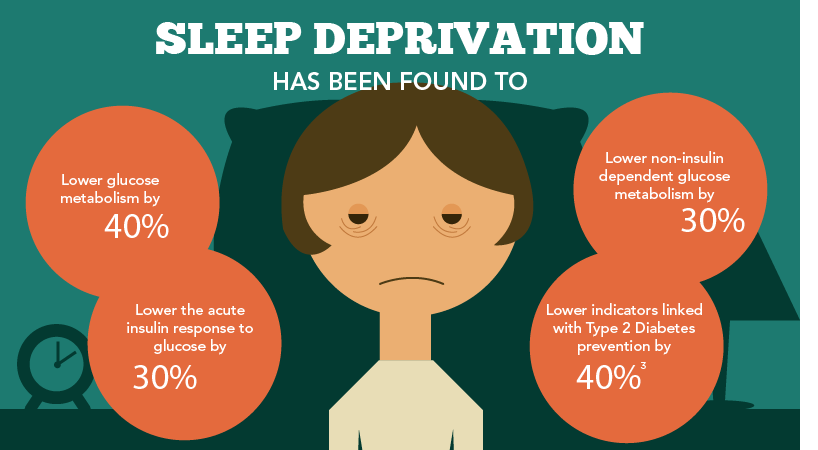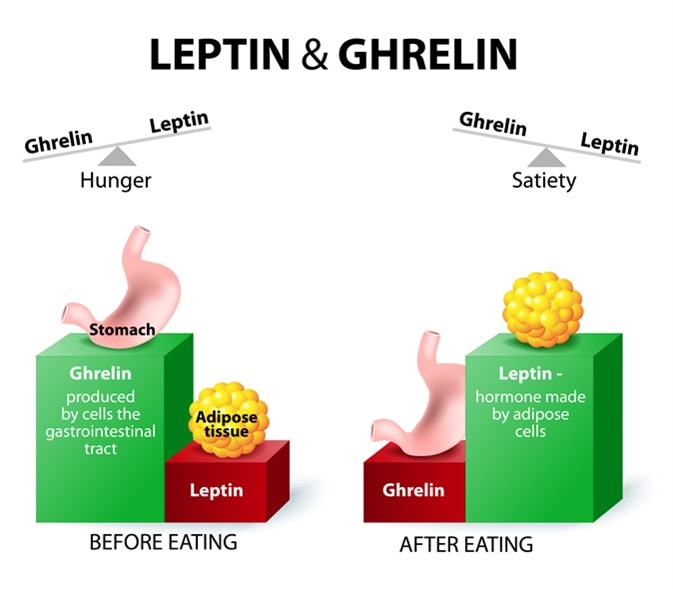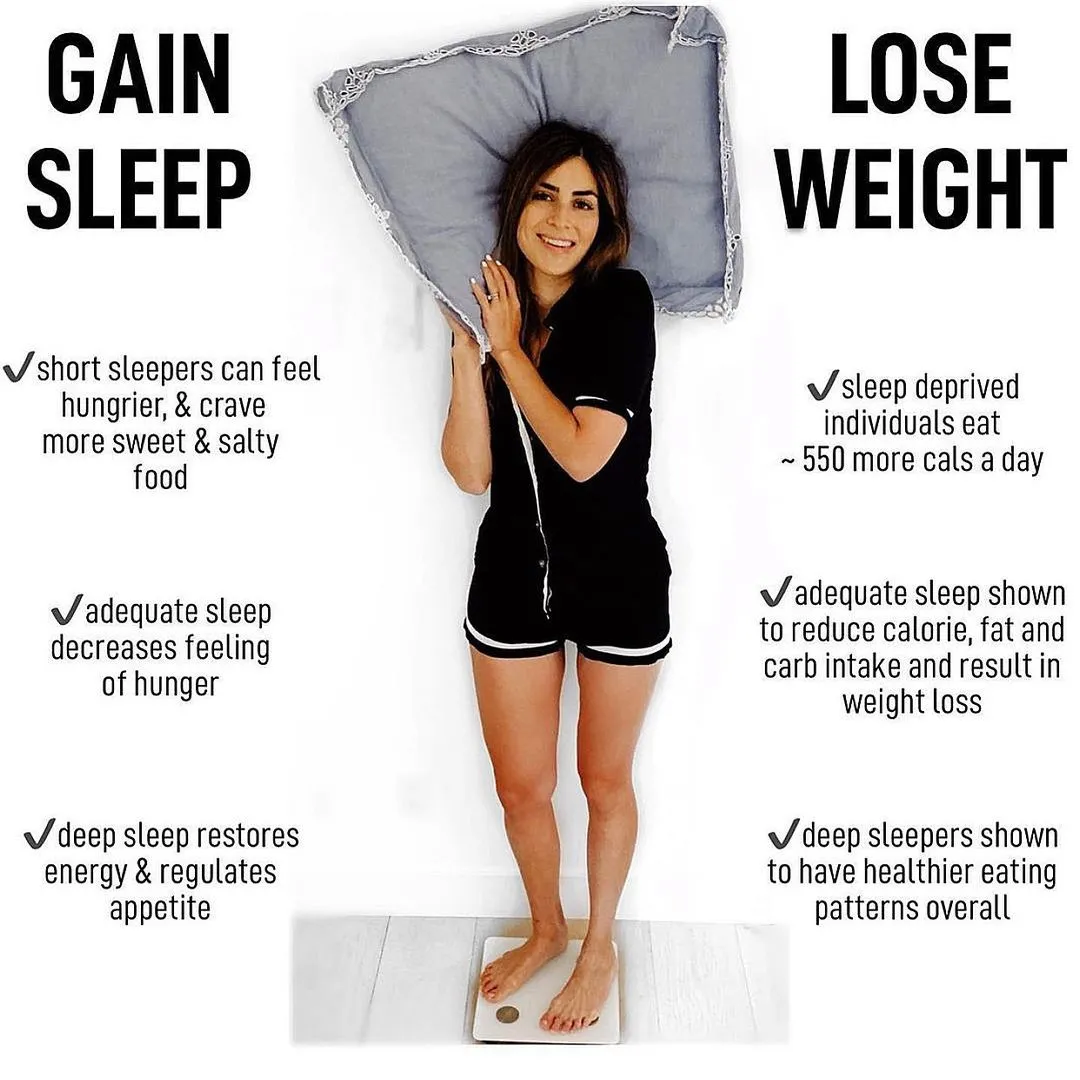When attempting to shed unwanted pounds, we often look at our grocery lists or gym habits, altering what we eat or seeking ways to increase physical activity to help us achieve our weight loss goals.
And, while those areas are crucial when it comes to weight loss, what if, despite your efforts, you find that your bulge still isn’t budging?
When it seems that your weight loss efforts are in vain, your motivation and mindset can suffer, often derailing you from your plan due to discouragement.
So, when looking to shrink your waistline, it’s important to look at all of the factors related to successful weight loss.
And, there’s one area pertaining to overall health that we often overlook when it comes to losing weight, can you guess what it is?
Sleep!
Yes, sleep is just as critical as the tried and true elements of nutrition and exercise when it comes to healthy weight loss!
How, you might ask? Let’s take a look…
Sleep And Weight Gain

Before we look at how deep sleep can aid your weight loss efforts, let’s examine the bad news first.
Some research suggests that a lack of sleep, particularly getting less than seven hours nightly, is linked to metabolic dysfunction, weight gain, and obesity.
And, what’s worse? This correlation seems to work in a vicious cycle, where a lack of sleep can lead to obesity, and obesity can lead to a decrease in quality/restful sleep.
Poor sleep seems to affect weight gain by altering both your metabolism and your hormones.
Metabolism

Metabolism refers to a chemical reaction that occurs within your cells where your body changes the food you eat into energy.
Obviously, you need energy for pretty much everything you do, from physical activity, to brain function, to blood circulation, and even growth.
The problem is, when you don’t get enough sleep, something known as glucose metabolism can be altered.
Glucose metabolism is considered to be the most efficient way that your body transfers energy. And, a lack of sleep hinders this process, making it less efficient, meaning that your body’s normal process of converting food into energy is slowed, or hindered, which can result in weight gain.
Unfortunately, this problem compounds, as your metabolic rate can also affect a few hormones and their function as well.
Hormones

Two hormones, or neurotransmitters, that are affected by your metabolism are ghrelin and leptin.
Dysfunction surrounding these hormones can lead to weight gain, as they are both linked to appetite.
Ghrelin is a hormone responsible for making you feel hungry. It’s your body’s “hey, it’s time to eat now” signal.
Leptin, on the other hand, is essentially your body’s full switch, communicating to your brain that you’ve had a sufficient amount of food.
When you’re awake, levels of these two hormones increase and decrease to tell you when it’s time to eat, and when it’s time to stop eating.
Then at night, as you sleep, these hormones are regulated.
So, when you lack healthy sleep, altering the regulation of ghrelin and leptin, this can lead to greater feelings of hunger and fewer cues signaling to your body that you are full, which of course can both lead to weight gain.
And, studies have also proven a lack of healthy sleep to have a negative effect on even the types of food we eat, with results of such research showing that people who lack sleep tend to choose foods higher in both carbs and calories.
While much research is still being done concerning the connection between weight gain and a lack of sleep, the reverse is a proven certainty: there is a positive link between healthy deep sleep and a healthy body weight!
Deep Sleep And Weight Loss
Have you ever started your morning not feeling refreshed from your night of slumber?
Perhaps, you’ve been awake off and on throughout the night, or you’ve slept through the night but haven’t truly entered a phase known as deep sleep?
Deep sleep, also known as slow wave sleep, is non-REM (non rapid eye movement) sleep. During this stage of sleep, your heart rate slows, your breathing slows, and it is during this type of sleep that your body really gets down to work even the work of weight loss!
Throughout deep sleep, your body:
- regenerates cells
- grows and repairs bones and tissues
- boosts or strengthens your immune system
- supplies blood to muscles
- builds up energy storage
In other words, this stage of deep sleep works to help your body recover and refresh. Some would even say detoxify.
And, it’s during this time of refreshing these bodily processes that your weight loss efforts can benefit!
While a lack of sleep can hinder your metabolism, deep sleep helps to regulate these processes and the hormones involved in them.
Looking at the reverse effects of poor sleep, you may see the obvious result of deep sleep regulating both ghrelin and leptin, meaning your body will be able to accurately communicate when you are both hungry and full, aiding in your weight loss efforts.
But, deep sleep also works to keep a few other hormones functioning properly.
Cortisol and growth hormone are two other hormones directly affected by sleep. And, each of these can affect your ability to lose weight.
First, let’s take a look at growth hormone…
Perhaps you’ve heard of how exercise can work to increase levels of growth hormone in the body, potentially decreasing fat storage and building muscle.
Well, this is technically true, but most of your growth hormone is made during deep sleep.
And, as these levels are increased, your body can break down fatty acids more efficiently.
Even better, as you seek to lose weight, if you’re getting adequate deep sleep and exercise, growth hormone can help to both increase muscle mass and decrease fat!
And, as for cortisol, I’m sure many of you are familiar with this dreaded c-word when it comes to weight gain.
Cortisol has long been linked to stress, with stress being the precursor to the release of this hormone. And, excess amounts of this hormone are commonly known as a culprit in the case of belly bulge.
Elevated cortisol levels have been associated with:
- increased cravings for “junk” foods making it more difficult for your body to use fat as fuel (causing an increase in fat storage)
- an increase in the likelihood of your body breaking down muscle for energy instead of fat
During deep sleep, cortisol levels are decreased which works to combat those cravings and allow your body to appropriately use fat as fuel.
And, as a point of emphasis, not just any stage of sleep accomplishes this. Deep sleep is exactly what the doctor ordered when it comes to cortisol regulation!
Magnesium – The Missing Link

Now to address the elephant in the room…what if deep sleep evades you?
If you’re one of many who find yourself in the center of this unspoken venn diagram, lying within the overlapping area of those who’ve struggled to successfully lose weight and achieve healthy deep sleep on a regular basis, magnesium may be where all of life’s questions are answered for you.
Okay, so magnesium may not answer all of life’s questions, but it may certainly help you achieve deep sleep and thus aid in your weight loss woes!
Studies show that magnesium deficiencies have been linked to insomnia, with individuals having low magnesium levels often waking throughout the night or experiencing restlessness.
How so?
Well, magnesium helps your body to maintain adequate levels of what is known as GABA.
GABA (Gamma-Aminobutyric Acid) is a neurotransmitter that essentially works to calm your nervous system. It helps your mind to drift from wakefulness to sleep, reducing nerve cell activity.
Research has shown magnesium improves both sleep duration and quality when it is added to supplement a healthy diet.
Additionally, magnesium can help to lower stress levels, and we saw briefly above how elevated stress levels can negatively impact weight loss due to the release of cortisol in response to stress.
Magnesium can aid in calming your mind and nervous system to allow you to peacefully drift off to sleep as well as help you to achieve needed restful and restorative deep sleep, a crucial component of any weight loss endeavor!
Recap
While a lack of sleep can wreak havoc on your weight loss efforts, getting adequate deep sleep along with a healthy diet and ample amounts of physical activity can help to:
- keep your body appropriately transforming food into the energy it needs to perform needed functions
- regulate ghrelin and leptin levels to accurately signal to your body when you are hungry and when you are full
- decrease cravings for calorie and carbohydrate-rich foods which contribute to weight gain
- elevate growth hormone levels which help to decrease fat storage and improve muscle mass
- decrease levels of cortisol to help fight cravings and allow your body to appropriately use fat (instead of muscle) for fuel
Magnesium aids in maintaining healthy GABA levels within the body, resulting in better quality deep sleep.
References:
https://www.sleepfoundation.org/physical-health/weight-loss-and-sleep#
https://pubmed.ncbi.nlm.nih.gov/15583226/
https://www.ncbi.nlm.nih.gov/pmc/articles/PMC3763921/
https://www.healthline.com/health/weight-loss/the-science-behind-sleep-and-weight-loss
https://www.mayoclinic.org/healthy-lifestyle/weight-loss/in-depth/metabolism/art-20046508
https://www.ncbi.nlm.nih.gov/pmc/articles/PMC2929498/
https://www.sleepfoundation.org/how-sleep-works/how-your-body-uses-calories-while-you-sleep
https://www.medicalnewstoday.com/articles/325629#Good-sleep-is-part-of-successful-weight-loSs
https://www.verywellhealth.com/sleep-more-lose-weight-3233044
https://www.healthline.com/health/deep-sleep#benefits
https://www.acefitness.org/education-and-resources/professional/expert-articles/7029/does-sleep-help-you-lose-weight/
https://us.exantediet.com/blog/deep-sleep-and-weight-loss/
https://www.verywellmind.com/what-is-deep-sleep-5207950
https://www.sklarcenter.com/blog/sleep-deprivation-weight-gain-link/
https://www.sciencedaily.com/releases/2000/11/001120072314.htm
https://www.psychologytoday.com/us/blog/sleep-newzzz/201805/what-you-need-know-about-magnesium-and-your-sleep
https://www.objectivewellness.com/journal/posts/meet-gaba-your-new-best-friend-for-falling-asleep
https://www.healthline.com/nutrition/magnesium-and-sleep
https://www.sleepfoundation.org/magnesium


